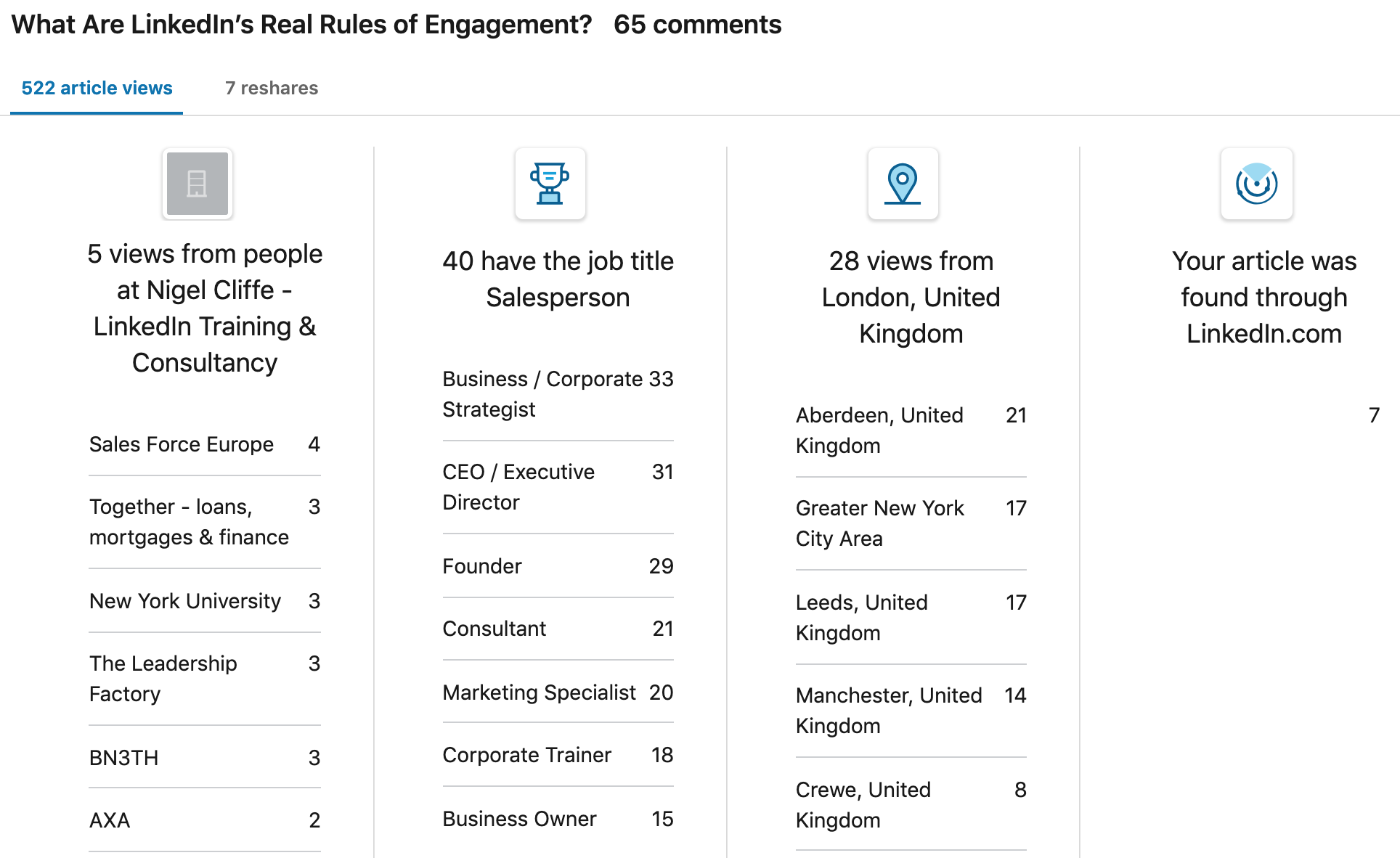Published March 25, 2019
Read Time
LinkedIn is the most popular channel for B2B marketers distributing their content. It is responsible for 46% of the social traffic going to company websites, and its membership includes around 46 million decision-makers. Impressive stats, you’ll agree.
Telling you content is king on LinkedIn, and explaining why it is good for engagement, and ultimately, business growth, is something I do a lot. This is because I know it works. I’ve seen the benefits for others and experienced them myself many times over.
But I also know that simply telling you about why content is powerful may not be enough. You also need to know how to go about putting it together.
Remember, though, every business is different, and LinkedIn is primarily about individuals. People do business with people. The content you shape must reflect something of you, even though, as we shall see, it isn’t necessarily about you. In fact, it’s not about you at all…
LinkedIn has integrated its Pulse content into its user’s homepage feed, which makes it very straightforward for you to post content on the platform. This is a vital aspect to using LinkedIn dynamically, and to being active on it.
If you think of LinkedIn as a means of marketing your personal brand digitally, then one means of doing this is by blogging.
Blogging is a well-established form of digital marketing content, and you can most definitely ‘blog’ on LinkedIn.
However, posting articles on LinkedIn is not the same as posting blogs on your business website.
This goes back to the whole question of how to craft your content for LinkedIn. The key thing to note is that people access LinkedIn content differently.
On a website, people are often actively seeking out information and therefore choosing to read a blog or article. After all, they have chosen to visit your website in the first place. On LinkedIn, they will see content as part of their feed, and they may, or may not, choose to click on the item to find out more. At this point, the relationship is more transient.
Obviously then, you must use a choice of an image, an attention-grabbing headline and intro to make them want to do this. But you might also want to mix it up. An image one time, a text-only post the next, a video next. Sometimes short, sometimes longer. Sometimes fact-driven, others simply amusing. I have found the pick ‘n mix option works best. Hashtags are also now in use on LinkedIn and should be used to connect with people who are interested in the same topic. LinkedIn will provide suggestions for useful hashtags, but don’t be afraid to add your own. I’d recommend just a few, perhaps three or four. Overusing hashtags looks very ‘spammy’.
This isn’t just a question of descriptions. What goes in an article is different from a LinkedIn update post, even though both appear at the head of your feed.

Let’s start with a LinkedIn Article.
A LinkedIn article should be something you structure for maximum impact. It’s not just an off-the-cuff thought you put into words. It will undoubtedly take you longer to write.
Also, it should be aimed squarely at your target audience. Don’t be tempted to treat it as a puff-piece for your business. Make it about them and their issues. Demonstrate your depth of knowledge about something which is of concern to the people you want to connect with and influence. Make it useful to find solutions to their pain points.

Generally, I’d advise you to keep it shorter than a conventional website blog, perhaps no more several hundred words (although this one extends to almost 2,000 words because I wanted to describe an important strategy in more detail).
Make it easy for readers to digest the main points at a glance. But if you have more to say, then that’s fine too. If its quality content you are writing, people will read it. But remember, this is LinkedIn, so don’t expect your reader to have the time and patience to read War and Peace!
A LinkedIn post, on the other hand, can be much briefer than an article. It’s essentially a snippet to update your feed. However, you should still treat your posts as having intrinsic value in building your personal brand and attracting your target audience.
Think of it in terms of adding value to others with what you post. What are you offering them by posting an update on your feed? Resist the urge to make it all about you, or even what you can offer them. LinkedIn is not the place to sell! I’d say resist the desire to post personal pictures or twee quotes. They simply don’t add value to what is intrinsically a business-to-business platform.
I often think of it this way: what are the specific questions people often ask me about my areas of expertise? What knowledge can I share that will provide them with some benefit?
Show your awareness of wider issues or pressing concerns. And don’t be afraid to entertain as well as inform. Sharing your opinion, providing it is done with respect, is a good thing. People typically don’t engage with bland content.
Technically, LinkedIn has a limit of 1,300 characters on a post, so you should craft content well within this limit for maximum impact.
As I write this piece there is no doubt a significant difference between an Article and a Post. An Article is likely to receive significantly fewer views, compared to a post. But the engagement, as a percentage, can be much higher. Much more of my time is spent writing posts versus articles, but the depth of an article, such as this one, cannot be written as a post.
I think of an article as being the opportunity to provide a more in-depth view on a topic. I use it to help define me as a thought leader on my topic.
According to Hootsuite, in a single year, LinkedIn video posts generated more than 300 million impressions, with engagement levels three times more than written posts. From my own experience, I know this to be true.
There is also data to suggest that native LinkedIn videos are more likely to spark conversations between members. And this is the point – you seek engagement, not views.
Video then, is an obvious choice for creating compelling content. But while the technology to create your own video has never been more accessible, getting it right can still be a challenge.
The important thing is that you have something to say and that you say it in a way that makes it interesting for your viewers.
A long, rambling monologue filmed on your smartphone from the back seat of your car is unlikely to strike a chord with your audience.
Keep things compact, check how your voice sounds when recorded and ensure you sound as dynamic and engaging as possible. Consider taking the video outdoors, where natural light provides the best source of lighting. Adding voice-over text to your video is also important. Many people consume video silently, so adding your spoken text is quickly becoming a must.
At the other end of the scale, paying for a professional video that comes across as too cold and corporate is also likely to fail to make your audience sit up and take notice. But having one as part of your ‘portfolio’ might be a good thing.
Always think about the personalisation of your LinkedIn content.
At the start of this article, I mentioned that LinkedIn is mainly about individuals. Yes, it’s for business people, but it’s a social platform, so you need to be sociable on it.
How does this sociability work with content?
Adding a personal touch to your content adds value to it. Don’t let your content be too business-like and impersonal. Put your stamp of authenticity on it. LinkedIn is all about your personal brand, way before you talk about business matters.
As the saying goes, people do business with people. This is true whether it’s face-to-face networking, or digitally, through social media.
A word of warning though: you must strike a balance. Don’t make your content too personal. Always keep it relevant to your audience, and to who you are in business.
Just as LinkedIn is not simply about you, nor is it only about your content.
Many people feel they simply do not have the time, or sometimes the inspiration, to regularly update their LinkedIn feed with their own, original material. I get that, it happens to me too.
So, LinkedIn is also ideal for sharing other people’s content as well.
Some people like to call this content curation, but that sounds to me a little pretentious.
In fact, it’s pretty straightforward. When you come across content, on or off LinkedIn, that you feel will appeal to your connections and LinkedIn audience, simply share it yourself.
I’d emphasize that this is going to add a lot more value to you if you share this kind of third-party content than just be guilty of narrating only your own story. It’s not all about you, you know!
Also, by sharing it, you effectively create your own post, and this means you can add your own introduction to give this content context for your readers. Why do you find it valuable? How did it help you? What new perspective did it add to your opinion?
Choose carefully and keep your shared content relevant, at all times. Your audience begins to build trust in you, you don’t want to blow it with irrelevant content.
Another benefit is that this also helps you build stronger connections with people whose content you share, and hopefully, they’ll return the favour by engaging with and sharing your content with their own connections – an invaluable feature of a LinkedIn engagement strategy.
LinkedIn is a social platform, but this doesn’t mean you shouldn’t take a strategic approach to your content.
Rather than randomly posting updates or articles when the urge takes you, make time to do it regularly. This is how you build awareness of your presence.
You might call it a content plan.
Be clear about who you are trying to attract and engage with on LinkedIn and tailor your content to appeal to them.
This also applies to third-party content that you share.
There are millions of LinkedIn users. There is a huge potential audience out there, but you cannot possibly appeal to everyone. Have a focus and keep to it.
Work out who you want to engage with and approach your content creation like a campaign. At the same time, keep it feeling spontaneous and personal.
It’s not always easy to do this, but persistence pays off. LinkedIn isn’t about having an instant hit (although it sometimes can be!). It’s about playing the long game to help grow your business. Think of it as building trust, every time you interact on LinkedIn.
Did you know you can measure your efforts? LinkedIn can provide you with viewing analytics for your articles. This can be very useful to ensure you are attracting the right type of audience.

This will help you to shape your content and to see what works, and what doesn’t.
On how I can help you turn your Linkedin profile into multiple opportunities in a few hours.
© Copyright 2025 Value Exchange Privacy Policy Cookies Policy Website Design by Pivotal Marketing